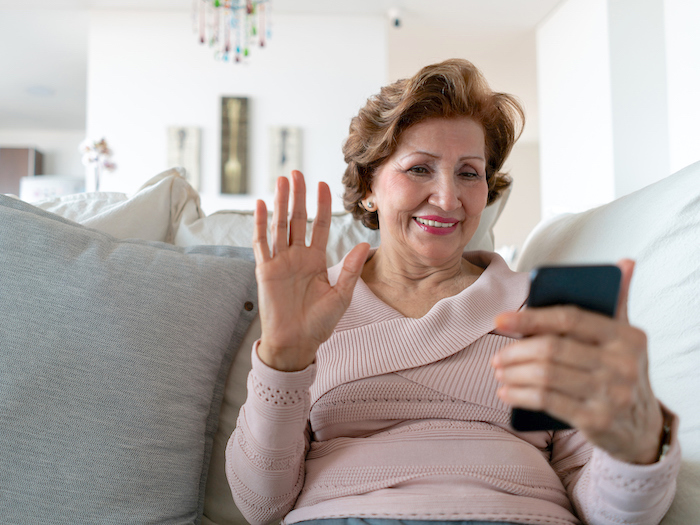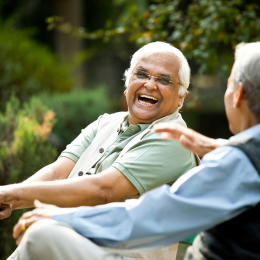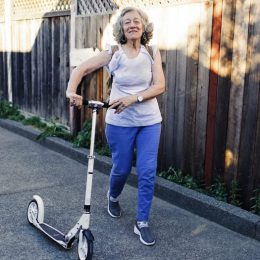7 Ways Older Adults Can Stay Connected from Afar
Social distancing or staying home because of coronavirus? Try one of these creative ideas to get active and maintain relationships.

Two of the most important things older adults can do for their health are to stay physically active and socially connected. That’s one reason why SilverSneakers members love our classes: They offer an opportunity to exercise and mingle with people of a similar age.
So when something forces you to stay home—like the new coronavirus disease (COVID-19), which spreads easily and can lead to serious complications in older adults—it can disrupt your routine.
Even if you know that avoiding crowds at this time helps protect you against coronavirus, this social isolation can put a major damper on your mood.
Luckily, sticking close to home doesn’t have to mean spending weeks in a recliner, cut off from the rest of the world. In fact, it shouldn’t.
“In these challenging times, it is particularly important that older adults not become sedentary or isolated,” says Karen Roberto, Ph.D., a senior fellow at the Virginia Tech Center for Gerontology.
That might mean you need to shift your habits temporarily—but that’s okay. “Just walking around the house or yard periodically throughout the day helps to keep one fit,” Roberto says.
Similarly, even though you need to keep at least six feet between yourself and others as much as possible to limit the spread of coronavirus (a.k.a. social distancing or physical distancing), it’s important to stay in touch remotely.
“Research suggests that older people who are more socially engaged are happier, more cognitively fit, have higher levels of immune-system functioning, enjoy more restful sleep, and may even live longer,” Roberto says. “Remotely spending time with family and friends is a great way to boost your morale and quality of life.”
Try these creative ideas to get active, maintain relationships, and perhaps even discover a new healthy habit.
1. Step, Step, Step
Walking is simply one of the best exercises you can do. Even if you’re limited to a small space, you can get some steps in. Put on supportive shoes, and pace around the room, walk up and down a hallway, or go up and down the stairs. When all else fails, march in place or do a seated march.
If your doctor hasn’t advised against it, you can also walk in your yard or neighborhood. Just be sure to keep at least six feet between yourself and others you meet along the way.
2. Show Your Face
When face-to-face IRL—that’s online lingo for “in real life”—isn’t an option, it’s time to go virtual. Video chat tools like FaceTime, Hangouts, Skype, and similar services make it easy to connect with family and friends across town, in a different state, or even in a different country, Roberto says.
You can even make it a group activity. Missing your book club, knitting group, gym friends, or family members who are also hunkering down? Set up a virtual meeting. Here’s how to do a Group FaceTime, group Hangout, or group Skype.
3. Just Call (or Text) to Say “I Love You”
Don’t have video capabilities? No problem.
“A phone call is the simplest way to check in with family members and friends,” Roberto says. “The conversation does not need to be lengthy. Sharing a brief bit of news keeps people engaged.”
You can also share photos by text or email, Roberto says. Showing someone a little of your world and seeing a little of theirs—a smiling grandchild, a cute dog, the last thing you cooked—can help you both feel more connected.
Tip: If you’re using your mobile phone, check your data plan to make sure you stay within your limits or to upgrade if you wish.
4. Work Out with SilverSneakers
Wish you could take SilverSneakers Classic, Circuit, Yoga, or EnerChi in your living room? If you’re a SilverSneakers member, you can access live fitness classes and wellness workshops through SilverSneakers LIVE. See the latest schedule and RSVP for classes here.
Plus, anyone can get workout programs for cardio, strength, and flexibility on SilverSneakers GO (free, iOS and Android). A really cool feature: You can adjust the difficulty of an exercise with just one click.
5. Engage in Healthy Competition
If you love board games or sports, there’s likely a social game you can play on your mobile device. Words with Friends 2 (free, iOS and Android) is still a fun way to test your linguistic skills against a pal’s. Golf Clash (free, iOS and Android) may not be the same as a real day on a course with your buddies, but it can be a fun distraction while you’re cooped up.
Got a grandkid who’s into mobile gaming? Ask what they like or recommend. If nothing else, you might start an interesting conversation.
6. Do More with Social Media
There’s both good and bad on Facebook, Twitter, Instagram, and other social media. But like most things in life, it’s what you make of it.
“When you do spend time on social media, make a rule that ‘if you like, you gotta write,’ as in, write a comment,” says Mark Rabo, founder of Revere, an app that helps you build friendships. “Writing a comment forces us to be thoughtful, and that’s what good friends are.”
On the other hand, if you’re overwhelmed by negative news or comments, log out for a bit, and do another activity.
Subscribe to our newsletter
It's quick and easy. You could be one of the 13 million people who are eligible.
Already a member? Click to discover our 15,000+ participating locations.
Follow Us
7. Stretch It Out
Too much time spent sitting can lead to stiff joints and tight muscles. Add the stress of a global health crisis, and you’ve got the recipe for shallow breathing, upset stomach, and poor mood.
Gentle stretches, whether standing or seated, can help relax your body and mind. Try one of these simple stretches for older adults.
What You Shouldn’t Do
Still afraid to reach out to loved ones, or worried that you’ll be a bother? Don’t be.
“Older adults should not hesitate to reach out to family members,” Roberto says. “Most do not perceive their older family members as burdensome.”
Feel free to take the initiative to check in with both family and friends. “If the person you contact appears busy or uninterested, that is okay—try someone else,” Roberto says.
Made a connection? Good. “Keep conversations light, but meaningful,” Roberto says. “While we all need to keep informed about coronavirus, it should not be the primary focus of all your conversations.”
Here’s a fun idea: Break out old photos, cards, and other mementos, and revisit happy times you’ve shared. You’ll likely both feel better in the moment and strengthen your bond.
Having a Hard Time Coping?
Regular exercise and communications with loved ones can help you stay healthy and upbeat. But if you find that stress interferes with your daily activities for several days in a row, or you are overwhelmed with sadness or anxiety, know that you are not alone.
Reach out to your primary care physician. You can also call the national Disaster Distress Helpline at 1-800-985-5990, or text 66746 with this message: TalkWithUs.
Take Your Favorite SilverSneakers Classes Online!
SilverSneakers members can access live fitness classes and wellness workshops through SilverSneakers LIVE. See the latest schedule and RSVP for classes here.
Not a member? If you have a Medicare Plan, it may include SilverSneakers—at no additional cost. Check your eligibility instantly here.




